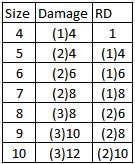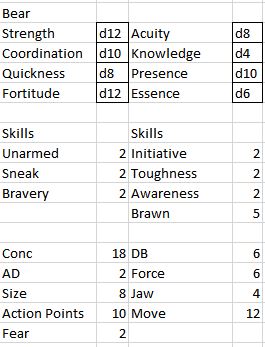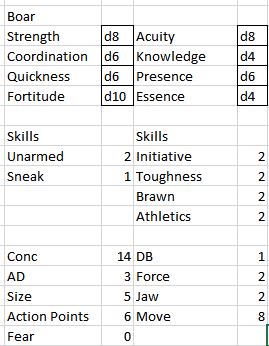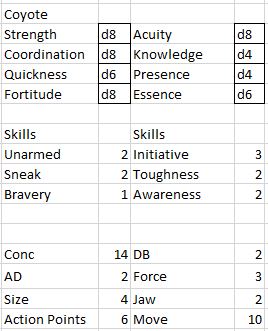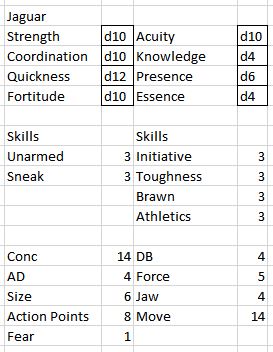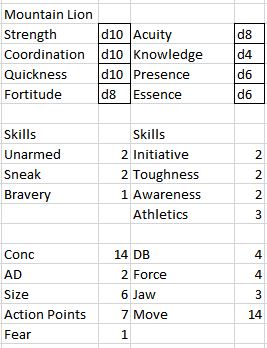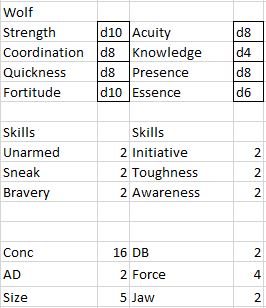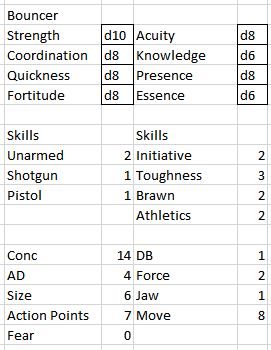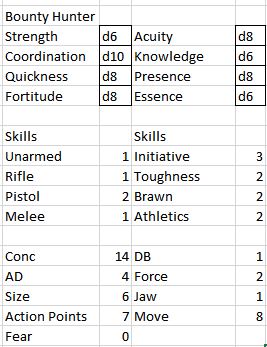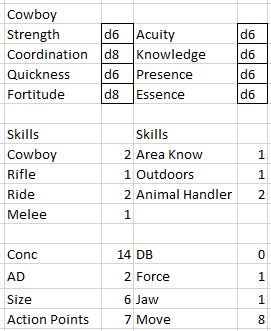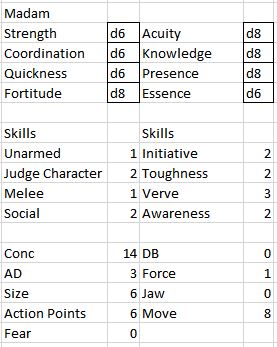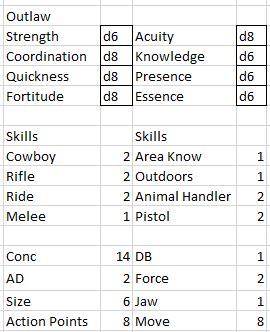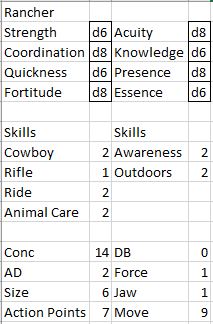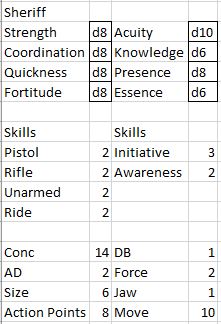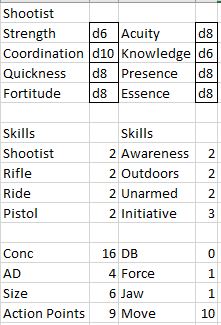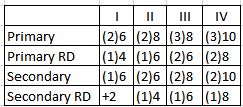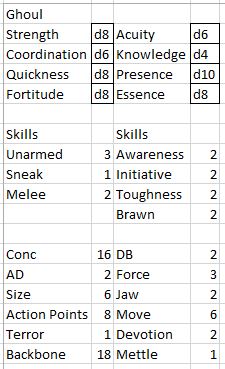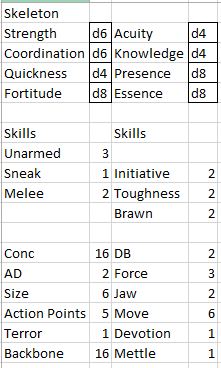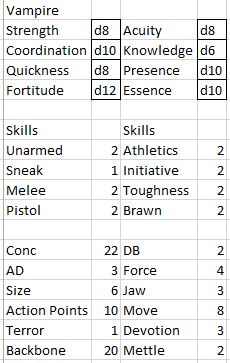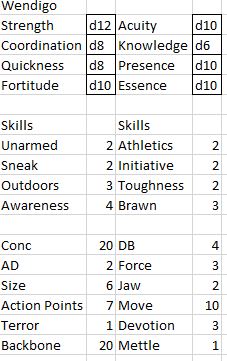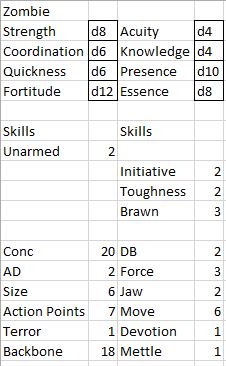Difference between revisions of "The West That Wasnt - Adversaries"
(→Humanoid Supernatural Creatures) |
|||
| Line 81: | Line 81: | ||
The primary attack is the preferred attack method for the entity. Some entities may have multiple secondary attack types. Like with animals, bite attacks are +2 TN except against prone or otherwise restrained foes (full dominance, +1 TN vs partial dominance). | The primary attack is the preferred attack method for the entity. Some entities may have multiple secondary attack types. Like with animals, bite attacks are +2 TN except against prone or otherwise restrained foes (full dominance, +1 TN vs partial dominance). | ||
| − | ==Humanoid Supernatural | + | ==Humanoid Supernatural Entities== |
| − | The following supernatural creatures are derived from humans. | + | The following supernatural creatures are derived from humans. Many are known as the undead, because they were once alive, and also once dead, but now exist in a state that is truly neither. |
[[image:ghoul.JPG]] | [[image:ghoul.JPG]] | ||
| Line 107: | Line 107: | ||
Vampire claws (Secondary, Class I) and bites (Primary, Class II) are deadly. Vampires are capable of the standard hand-to-hand attacks and defenses as well. Though their bite is their preferred attack form, vampires are intelligent and will use their claws or other hand-to-hand attacks to immobilize their prey before attempting a bite. | Vampire claws (Secondary, Class I) and bites (Primary, Class II) are deadly. Vampires are capable of the standard hand-to-hand attacks and defenses as well. Though their bite is their preferred attack form, vampires are intelligent and will use their claws or other hand-to-hand attacks to immobilize their prey before attempting a bite. | ||
| + | |||
| + | [[image:wendigo.JPG]] | ||
| + | |||
| + | The Wendigo is a staple of indigenous American folklore, often appearing as a gaunt, tall man. They are cannibalistic, and have an insatiable desire for flesh. In some legends the Wendigo grows taller after consuming prey, but it maintains the sickly and thin physique. | ||
| + | |||
| + | Many legends also indicate that the Wendigo has power over the winter storm, and will use this to advantage. Some also indicate that they have spirit forms as well as physical, which can make them extremely formidable. | ||
[[image:zombie.JPG]] | [[image:zombie.JPG]] | ||
Revision as of 10:59, 27 June 2020
The West is home to all manner of critters and varmints, as well as men and women from all walks of life. The bestiary contains Traits and Skills for a selection of them, both mundane and supernatural, should your game take a turn in that direction.
Each entry has a set of traits followed by important skills or attributes. If a Trait Skill is not listed, it is assumed to be 1. If a regular skill is not listed, it is not possessed. Creatures of Size 8 or greater cause Fear when within a single move (a number of Paces equal to their Move value).
Animals deal damage in combat based on their size and the following table:
Animal bites are deadly attacks. Most animal claws are impact attacks, subject to Judge discretion (exceptionally long or sharp claws should be deadly). Most animals that have claws begin a fight with claw attacks, attempting to slow their foe enough to allow for an effective bite. Bite attacks add +2 to the TN unless the foe is prone or otherwise immobilized. The Force and DB values listed apply to claw attacks (if they are impact).
Contents
[hide]The Mundane
The West is populated by both animals and human beings of all types. Some common examples are listed here for reference.
Animals of the West
The north American bear is one of the deadliest animals in the wilds anywhere in the world. Stats given are for a typical brown or black bear, but larger and more powerful examples certainly exist, with size 9 or even 10, and DB up to 10. Bears have claw and bite attacks.
Wild boars are one of the most widely disbursed animals on earth. Though attacks on humans are rare, they are not unheard of especially during the rutting season. Boar tusks are deadly attacks.
Coyotes are small predators, operating either individually or in packs. The coyote is common in indigenous American folklore, often occurring as a trickster. Coyotes generally hunt larger prey in pairs or groups, while smaller prey is caught by individuals. Coyotes have bite attacks.
Jaguars are the largest feline in the Americas, often 100-150kg. They are the premier stalk and ambush predator in the wild, capable of great patience and stealth and great bursts of strength and speed. Though formidable, jaguars avoid contact with humans and will only attack when cornered or otherwise given no alternative. Jaguars have both claw and bite attacks.
Mountain lions, or cougars, are large, wide ranging feline predators. Cougars are solitary and nocturnal, and are rarely seen during daylight hours. They hunt from ambush, but avoids humans and will yield prey to larger predators such as bears or jaguars. Mountain Lions have claw and bite attacks.
Wolves are large, pack hunting predators. Wolves have bite attacks.
Citizens of the West
Every saloon, or bar and grill, needs a doorman to keep the rowdiest violence outside.
The law is very localized in the West, and bounty hunters provide a vital service tracking down outlaws and fugitives while local lawmen keep the peace at home.
Cowboys are one of the most common occupations in the West. Many a man, and woman for that matter, makes their livelihood driving and caring for cattle across the vast expanses of the western landscape.
Ladies of the evening are as common as the cowboys that visit them, and someone has to handle their business dealings.
As with cowboys, outlaws are very common in the West. Many a man and woman make their living from greed and force of arms.
A rancher is someone who owns a ranch or farmstead. They are vital to the economy, providing jobs for cowboys and sometimes shootists.
The local sheriff is the law in many a town of the West.
Shootists are men or women who make their living as hired guns, either as bouncers, security or murder-for-hire.
The Supernatural
Supernatural enemies are often unique to a particular locale or story. The profiles that follow are guidelines for common types of scourges that infest the West.
Supernatural creatures may have many different types of attacks. The attacks are classified on the following table:
The primary attack is the preferred attack method for the entity. Some entities may have multiple secondary attack types. Like with animals, bite attacks are +2 TN except against prone or otherwise restrained foes (full dominance, +1 TN vs partial dominance).
Humanoid Supernatural Entities
The following supernatural creatures are derived from humans. Many are known as the undead, because they were once alive, and also once dead, but now exist in a state that is truly neither.
Ghouls are undead that subsist on the flesh of the living or recently deceased. Because they consume the soul through consumption of the body, they prefer victims they have personally killed. Most ghouls cannot gain nourishment from bodies that have been dead longer than a day or so.
Ghouls look like living humans, except that their skin is ashy grey, and their hair is stringy and thin, often falling out. They may have sores or other blemishes as well depending on their age. Many ghouls can pass for human for short periods.
Ghoul claws (Primary, Class I) and bites (Class I) are deadly. Ghouls can also use standard humanoid hand-to-hand attacks and defenses.
Skeletons are the animated corpses of the long-dead. They are automatons that must be controlled by another entity. Because of their lack of flesh, skeletons are very hard to damage with most firearms. To simulate this, they have an AV of 3 versus firearms except shotguns, against which they have an AV of 1. Any damage that does not cause a wound is ignored.
Skeleton claws (Primary, Class I) are deadly. Skeletons have no secondary attack.
Vampires subsist on the souls of the living by consuming their blood and life force. Depending on the origin of the vampire their method of subsistence and procreation may vary, as well as their appearance. Vampires that look human do not cause Terror unless they spend an action (4 AP) to do so. Vampires have 2 AV versus all deadly attacks. Vampire bites are deadly.
Some vampires are solely creatures of the night, while others may exist during daylight as well. Those who look human may have an occupation and a full character sheet of skills. Vampires make excellent story enemies because of their resilience and breadth.
Vampire lore includes many variations. Some may take on beast forms, or have the ability to otherwise alter their appearance. The vampire stats listed here are for an individual that has assimilated into human culture.
Vampire claws (Secondary, Class I) and bites (Primary, Class II) are deadly. Vampires are capable of the standard hand-to-hand attacks and defenses as well. Though their bite is their preferred attack form, vampires are intelligent and will use their claws or other hand-to-hand attacks to immobilize their prey before attempting a bite.
The Wendigo is a staple of indigenous American folklore, often appearing as a gaunt, tall man. They are cannibalistic, and have an insatiable desire for flesh. In some legends the Wendigo grows taller after consuming prey, but it maintains the sickly and thin physique.
Many legends also indicate that the Wendigo has power over the winter storm, and will use this to advantage. Some also indicate that they have spirit forms as well as physical, which can make them extremely formidable.
Zombies are the animated corpses of individuals that have not yet decomposed to the point of a skeleton. Like skeletons, they must be controlled by an external entity, however in many cases they may be capable of following simple directions. Zombies can regenerate at a rate of one would per minute unless their head is destroyed.
Zombie bites (Class I) are deadly. Zombies are also capable of punch (quick attack) and hold (standard) attacks. For a hold attack, the zombie must achieve partial or full dominance. Their next attack will be a bite.
